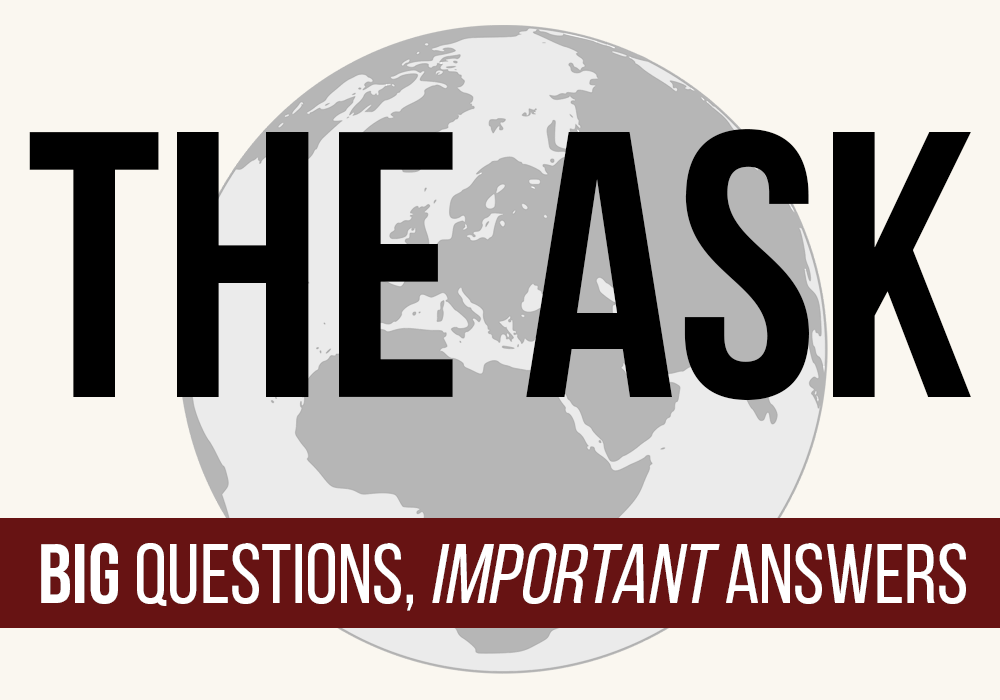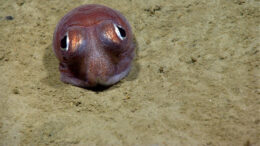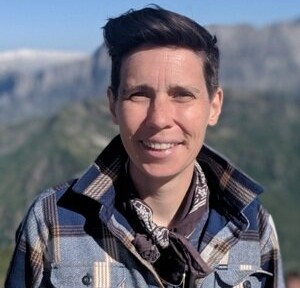At less than an inch in size, pygmy squid are the smallest of their kind. They shoot out a cloud of ink behind themselves and then use it as cover to attack their prey.
I hadn’t known this until I texted the “squid facts hotline” run by biologist Sarah McAnulty.
GET SOME #SQUIDFACTS @sarahmackattack https://t.co/xU8UUq7t6R pic.twitter.com/S8oJbbiHVA
— David (@drauh) September 5, 2022
It’s a side project of her larger endeavor, the education nonprofit Skype a Scientist, which pairs scientists with school classes, Scout troops, and other eager young learners so they can talk about squid and other aspects of science.
McAnulty knows all about how early encounters with science can change a kid. When she was young she traded her “Jurassic Park”-inspired adoration of dinosaurs for cephalopods after watching a National Geographic program on cuttlefish — a relative of squid — and hasn’t looked back since.
That guided her toward biology in college, but it wasn’t until she attended a lecture about cuttlefish camouflage given by a visiting marine biologist from Woods Hole Oceanographic Institution that she realized cephalopods could be a career.
“She had my dream job,” says McAnulty.
After that, McAnulty worked at Woods Hole for two summers and went on to complete her doctorate on Hawaiian bobtail squid.
Her current efforts focus not just on increasing people’s understanding of squid — an often-overlooked animal group — but on stemming anti-science rhetoric by helping scientists communicate better with the public.
The Revelator spoke to her about squid street art, how squid are surviving climate change and why kids ask the best questions.
What do you love about squid?
They’re unique animals. One of the things that’s always really captivating about cephalopods broadly is they’re so behaviorally and physically complex. They branched away from vertebrates so long ago that you get this unique opportunity to look at an animal that is complex, like we are, but developed that complexity completely independently of how we did.
Both squid and humans talk to each other. You and I are using sound right now, but squid use color change to communicate with one another. Do we call that language? We’re still learning so much about that.
We’re also discovering more squid in the deep sea that have neat adaptations for life in really harsh environments.
There are hundreds of kinds of squid. But can we say broadly how squid are faring in a climate-changing ocean? Or does it vary by species?
Overall squid are still doing pretty well. We can still fish for them. There’s still a lot of squid in the ocean.
If the year right now was 2016, I would tell you that squid we’re doing great, because back then we had fished out a lot of their predators, but the heat hadn’t really started to affect them.
But now we’re finding that with climate change, the geographical areas that they can live happily is shrinking, which is a real problem because that’s going to only continue to get worse. There are some species that are actively doing badly, and we’re going to start seeing a lot more of that.
There’s also a lot of species that we’ve only seen once or maybe five or 10 times ever. How do you know how an animal in the deep sea is doing when you barely know anything about it?
There are so many species that we just don’t even have enough information on to know how they’re doing at all.
Why did you start Skype a Scientist?
It was January of 2017. Trump had been elected and was getting inaugurated and a lot of scientists on social media were panicking. They were anxious and scared and feeling as though they had failed to communicate the direness of climate change.
I wanted to harness all that energy toward something useful and I thought that schools would be a good place to start getting people talking to scientists.
I wanted folks to have better access to the direct source of information. And I also wanted scientists to participate more in talking to people and have practice in talking to people who aren’t scientists.
So I started Skype a Scientist as a way to match scientists with classrooms. I think Scout troops got started in the second semester and libraries and others got added as it went along.
It’s a pretty simple concept that has really blown up. It serves on average about 10,000 groups a year.
We’re trying to make science more accessible to everybody.
What kind of feedback do you get from the scientists who participate?
What many of them don’t necessarily expect is how good questions are from elementary school students. When your mind is like open and curious, and hasn’t learned the concept of a so-called “stupid question,” you get these questions that are like, “Whoa, I don’t even know. No one’s ever asked me that.”
We’ve heard from a number of scientists — and this has happened when I’ve talked to these classrooms too — that it breaks you out of the same questions that you’ve been asking about your work for years. That’s not something that people would expect. You don’t necessarily expect to talk to a classroom of fifth graders and come away having new insight on the work you’re doing.
It’s also energizing to have a bunch of third graders excitedly yelling about your work and being a scientist. When you go back into the lab and you’re like, “Hey, yeah, my job is really cool.”
Also, students love lab tours. A lot of times like the only science spaces they’ve ever seen have been from sci-fi movies, and sci-fi movie labs and real labs are so different. So just picking your computer up and walking around the lab can be really eye-opening.
Overall, the practice of talking to non-scientists — particularly kids — helps to build that muscle for communicating so that you keep getting better and better.
Is it tough to be a scientist today considering how much anti-science and anti-fact rhetoric has become part of common discourse?
It is. The anti-science sentiment that I’ve felt is not recent, but in the last two and a half years it’s gotten way worse.
But it just renews my resolve to keep going and keep experimenting with new approaches to reaching people. Because we can’t give up, there’s no other option.
What are some of your other science outreach projects?
One is the squid facts hotline. You text a phone number and then you get squid facts texted back to you.
I’ve also been doing this street art project in Philadelphia, gluing painted squid on poles, street signs and all over the city. It encourages people to make use of the squid facts hotline. Some of them are little squid with a speech bubble saying squid facts like, “Hey, I’m a Humboldt squid. I can be six feet tall. And I flash white and red to communicate with other squid.” Or maybe it’s a little bobtail squid saying, “Hey, I can ooze glue from my skin.” They can make their own underwater glue and stick shells and rocks to themselves. That’s a cool party trick.
I also participated in Squidtember, which was proposed by the group OceanX. They reached out to me and said, “we’re going to talk about squid all month,” which is all I ever wanted to hear from anyone.
View this post on Instagram
I was totally in and I spread the word with other squid biologists and all the other squid people that I know on Twitter. Everybody was all about it, including a squid lab in Auckland, New Zealand, scientists in Europe, and all over the United States.
What happens if we lose squid?
Squid are an important food for a lot of animals, including whales. A sperm whale can eat 700 squid a day. Bigger fish, like tuna, also eat squid. So do pinnipeds, like sea lions. A lot of animals rely on squid, even other squid. And a lot of humans eat them, too.
From an ecosystem services perspective, they’re really important for food webs. If you lose squid, your ecosystem is in bad, bad shape.
They’ve been on Earth for more than 500 million years. We’ve had cephalopods longer than we’ve had trees. They’re really ancient animals that have lived through five mass extinctions. And now we’re living through the sixth. I just have to hope that some of them make it through this one. I’m pretty confident that at least some of them will, because there are squid in many different areas of the ocean, doing a lot of different things, and having a lot of different approaches to life. I’m hoping at least one of them makes it.
Get more from The Revelator. Subscribe to our newsletter, or follow us on Facebook and Twitter.
Previously in The Revelator:
‘Spineless’ — What Jellyfish Can Teach Us About the Oceans’ Future
![]()


